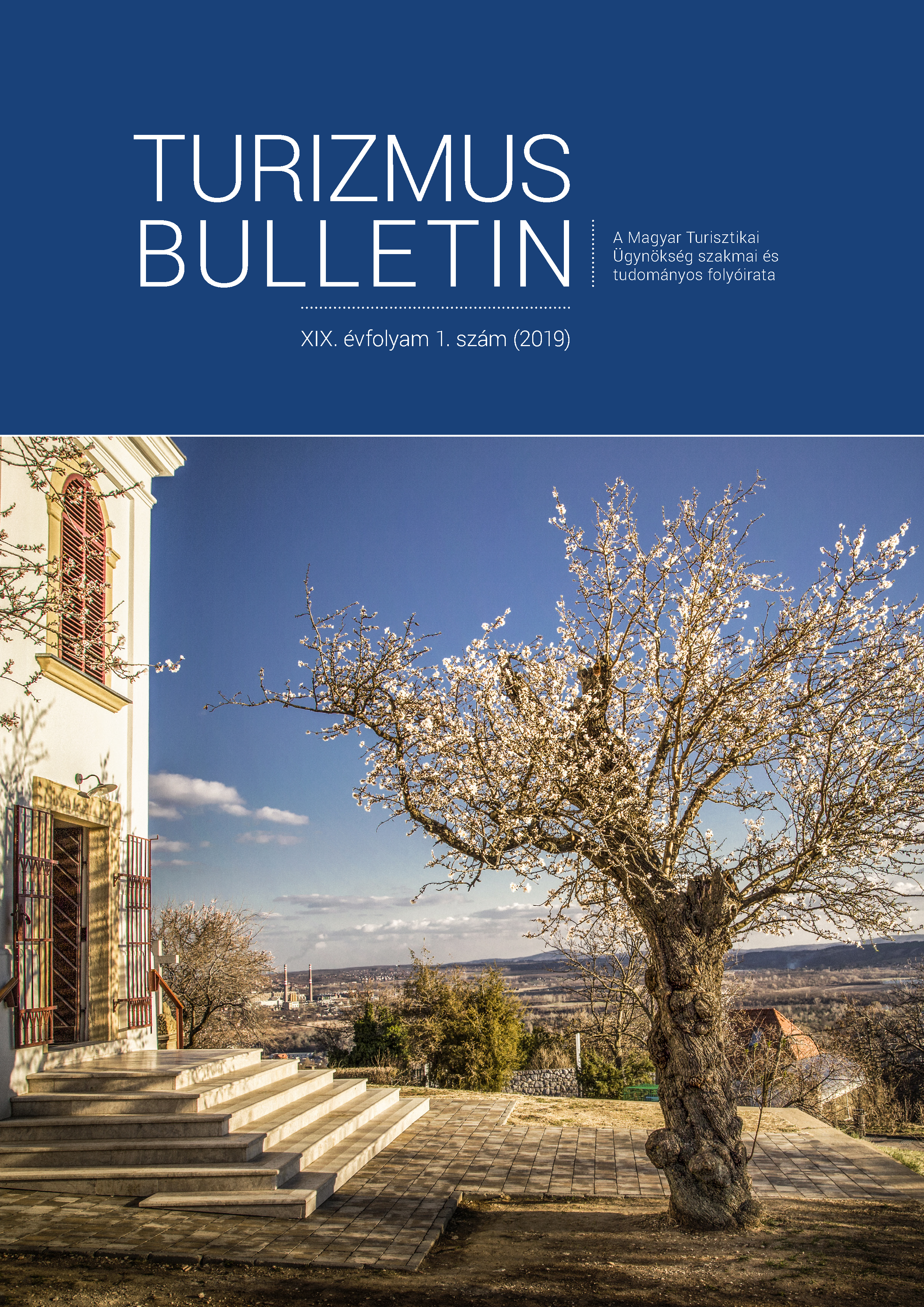Nyaralás alatti munkavégzés: a workcation turizmus elméleti és gyakorlati kérdései
DOI:
https://doi.org/10.14267/TURBULL.2019v19n1.1Keywords:
workcation, nyaralás, stressz, digitális nomádAbstract
Munka, szabadidő és alvás a három fő tevékenység, melyek ciklikus váltakozásai mentén éli életét a modern ember. A három alaptevékenység a múltban egyértelműen elkülönült egymástól. A határok elmosódása a későmodernitás trendje, melynek következményeképpen napjainkban két, egymással ellentétes, utazási forma terjedésének lehetünk tanúi: a staycation (turizmus az otthon elhagyása nélkül) és a workcation (nyaralás alatti munkavégzés). A tanulmány ez utóbbi jelenséget vizsgálja meg elméleti és gyakorlati oldalról: a szerző először egy saját workcation koncepciót fogalmaz meg, majd a szakirodalom és az online kérdőíves megkérdezés elemzésének eredményeként hat különböző workcation turista típust különít el és jellemez. Ezek alapján meghatározza azt a szegmenst, mely igények figyelembevételével egy adott település fenntartható turisztikai fejlesztéseket vihet végbe. A szerző zárásként egy külföldi példát is bemutat, ahol ezek a fejlesztések már megvalósultak, és sikeresen működnek.
References
ARTHUR, C. (2012): How tablets are eating the PC's future – but might save the desktop computer. https://www.theguardian.com/technology/2012/apr/25/tablet-pc-market-analysis Letöltve: 2018. október 22.
AU, W. C. – AHMED, P. K. (2015): Exploring the Effects of Workplace Support on Work-life Experience: a Study of Malaysia. Human Resource Development International. 18. pp. 346– 365.
BAUMANN, Z. (2000): Liquid Modernity and Beyond. Cambridge: Polity.
BEIGI, M. – SHIRMOHAMMADI, M. (2017): Qualitative Research on Work-Family in the Management Field: A Review. Applied Psychology. 66(3). pp. 382– 433.
BRADBERRY, T. (2017): Why Smart People Do not Multitask. http://www.cnbc.com/2017/01/12/why-smart-people-dont-multitask.html Letöltve: 2017. január 3.
CSÍKSZENTMIHÁLYI M. (2014): Az öröm művészete. Budapest: Nyitott műhely.
DECI, E. L. – RYAN, R. M. (2008): Facilitating Optimal Motivation and Psychological Well-being across Life’s Domains. Canadian Psychology. 49. pp. 14– 23.
ECO, U. (2017): Chronicles of a Liquid Society. – Faith, Hope and Clarity. Houghton Mifflin Harcourt.
FLEETWOOD, S. (2007): Why Work-life Balance Now? The International Journal of Human Resource Management. (18)3. pp. 387– 400.
FRICKER, R. D. (2012): Advantages and Disadvantages of Internet Research Surveys: Evidence from the Literature. https://core.ac.uk/download/pdf/36731123.pdf Letöltve: 2018. október 20.
GILBERT, D. – ABDULLAH, J. (2004): Holidaytaking and the Sense of Well-being. Annals of Tourism Research. 31(1). pp. 103– 121.
HAAR, J. M. – RUSSO, M. – SUNE, A. – OLLIER-MALATERRE, A. (2014): Outcomes of Work-life Balance on Job Satisfaction, Life Satisfaction and Mental Health: A Study across Seven Cultures. Journal of Vocational Behavior. (85)3. pp. 361– 373.
HOWARTH, F. (2015): Laptop vs. Tablet: How Each Device Drives Productivity. https://insights.samsung.com/2015/06/19/laptop-vs-tablet-how-each-device-drives-productivity-infographic/ Letöltve: 2018. október 20.
HOUSTON, D. (ed) (2005): Work-Life Balance in the 21st Century. Basingstoke: Palgrave Macmillan.
JAMES, A. (2014): Work-life 'Balance' and Gendered (im)Mobilities of Knowledge and Learning in High-tech Regional Economies. Journal of Economic Geography. 14(3). pp. 483– 510.
MARAGATHAM, B. – AMUDHA, R. (2016): Work-life Balance of Women Bank Employees in Kumbakonam Municipal Precinct. Indian Journal of Science and Technology. 9(27). pp. 1– 7.
MARSHALL, J. (2012): Legal Opinion: Working while on Holiday. http://www.personneltoday.com/hr/legal-opinion-working-while-on-holiday/ Letöltve: 2017. november 20.
McKEOWN, G. (2014): Essentialism. The Disciplined Pursuit of Less. Sunbury: Currency Publications.
MESSERSMITH, J. (2007): Managing Work-life Conflict among Information Technology Workers. Human Resource Management. 46(3). pp. 429– 451.
MICHALKÓ G. (2010): A Boldogító utazás. A turizmus és az életminőség kapcsolatának magyarországi vonatkozásai. MTA Földrajztudományi Kutatóintézet, Budapest.
MICHALKÓ G. – TEVELI-HORVÁTH D. – SULYOK J. – KISS K. – JANCSIK A. (2014): A balkán(i)ság turisztikai reprezentációjának jólléti dimenziói. Turizmus Bulletin. 16(2). pp. 42– 50.
NAWIJN, J. – DAMEN, Y. (2014): Work during Vacation: Not so Bad after All. Tourism Analysis. 19(6). pp. 759– 767.
NEULINGER, J. (1982): Leisure lack and the quality of life: The broadening scope of the leisure professional. Leisure Studies. 1. pp. 53– 64.
NIPPERT-ENG, C. E. (1996): Home and Work: Negotiating Boundaries through Everyday Life. 1stedition. University of Chicago Press.
NOVA, A. (2017): These Digital Nomads Have Ditched the 9-to-5 Life. https://www.cnbc.com/2017/10/17/these-digital-nomads-have-ditched-the-9-to-5-life.html Letöltve: 2017. november 3.
PENN, M. J. – ZALESNE, E. K. (2007): Microtrends: The Small Forces Behind Tomorrow's Big Changes.First Edition. New York: Twelve.
PIETERS, J. (2017): Nearly 70% of Netherlands to take summer holiday; France, Spain top destinations. https://nltimes.nl/2017/06/14/nearly-70-netherlands-take-summer-holiday-france-spain-top-destinations Letöltve: 2018. szeptember 6.
RUSSELL, J. (2013): 7 ‘Digital Nomads’ Explain How They Live, Work and Travel Anywhere in the World. https://thenextweb.com/insider/2013/12/15/7-digital-nomads-explain-how-they-live-work-and-travel-anywhere-in-the-world/9/ Letöltve: 2017. november 3.
SARDESHMUKH, S. R. – SRINIVASAN, V. (2014): ICT and work–family balance: context of Indian software services. Labour & Industry: a journal of the social and economic relations of work. http://www.tandfonline.com/doi/full/10.1080/10301763.2013.877119?scroll=top&needAccess=true Letöltve: 2017. november 30.
SILVERMAN, R. S. (2015): This Summer, How About a Workcation? http://www.wsj.com/articles/this-summer-how-about-taking-a-workcation-1435072989 Letöltve: 2016. november 3.
STATT, N. (2015): The future of the tablet is the PC. https://www.cnet.com/news/the-future-of-the-tablet-is-the-pc/ Letöltve: 2018. október 20.
SÜSS, S. – SAYAH, S. (2013): Balance between Work and Life: A Qualitative Study of German Contract Workers. European Management Journal. 31(3). pp. 250– 262.
TARI A. (2010): Y generáció. Budapest: Jaffa.TARI A. (2011): Z generáció. Budapest: Tericum Kiadó.
TITCOMB, J. (2017): Tablet sales to fall for third successive year as PC market stabilises. https://www.telegraph.co.uk/technology/2017/01/11/tablet-sales-fall-third-successive-year-pc-market-stabilises/ Letöltve: 2018. október 20.
Internetes forrás
BECOME NOMAD: Digital Nomad Lifestyle – The Modern Nomads. http://becomenomad.com/dig-ital-nomad-lifestyle/ Letöltve: 2017. március 20.

